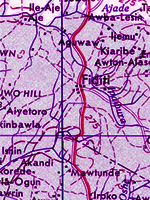|
Fiditi is a town I can claim by birth. I was born here, in 1970.
It is a town almost phantasmagoric in its postmodernism. For example,
because my parents were both teachers in the small town, we lived
in a rented house that the absentee landlord fancifully called Agnes Cottage. The last time I checked, the yellow house was still there
on Iware road, still yellow, still a cottage named after a mysterious
being called Agnes. As a child, with neighbours so polite they greeted
even four-year-olds with the respectful Eku…
Most Yoruba people would greet a child, if they greeted at all,
with the impersonal, reverence-neutral Kaaro. In my childhood recollections of Fiditi, the natives greeted you just
as they would an adult and thereafter promptly engaged you in Yoruba
conversation like any other adult. I woke up each morning from my
‘English’ bed, a laddish individual, Monsieur Ipadeola’s
son, and got immersed into a complex Yoruba universe in which the
very pronoun used in greeting me was plural, generic, and vested
with undefined responsibilities.
Midlife, and with some mileage in travel on the African continent,
I realize that the E ku… might very well be the oldest form of greeting in the Yoruba
language. In Sierra Leone, Yoruba folks are called Eku people to this day. You will be greeted in Fiditi in this fashion because
you will be, regardless of your age or genealogy, verbally assimilated
as a native. It is not a conscious act of assimilation. It is something
the collective unconscious of the people, or is it the place, makes
happen. The world, after all, is a dangerous place, demanding that
we form human company, and in this place so laissez faire, brown
and supine, your person, whoever you are, is valuable.
Once, before man conquered nature to the extent to which he now
has, and before law and order took root in our rainforest society
the way it now has, a tiny band of men settled on a nameless knoll,
named the knoll, found themselves women, had children, died and
got buried. The original expedition that came to rest on the knoll
was typical in that it was called, in Yoruba, ajorin ( a
wayfaring – or journeying – band). It was foolish to
travel alone in those days.
The name that the band gave to the knoll was Fiditi, literally,
where men came to rest, sitting down. From the original knoll, a
hamlet emerged, then a village, now a town. By the time the Fulani
wars pushed the old Oyo Kingdom further down south from its northern
enclave of Oyo-Ile to its present location, circa 1840, Fiditi was
already a thriving town, with a tradition of fruit farming and big
game hunting.
Without radiocarbon dating machines to examine the bones of the
first settlers, without written records, relying entirely on oral
tradition and the very name and praise-names or oriki of the town, we know the town was settled very much the same way the
surrounding towns of Awe, Ilora, Iware and Akinmoorin were settled
- by travellers who found this place-on-the-knoll hospitable enough
to settle in.
Today, if you looked hard enough, you may find a clan of doomsayers
pondering the outcomes of the large Hadron collider, in a palm-wine
joint, in the cool of a Fiditi evening. You will find young lovers
strolling hand-in-hand on the asphalt streets, you will encounter
what appears to be endless elementary school compounds and a few
secondary schools, you will see the aged, quietly talking into their
cell phones with unseen partners who may be anywhere on planet earth.
It is that kind of town.
Fiditi smells like food. Indeed, the oriki of the town begins:
Fiditi ilu iyan… (Fiditi, place of pounded yam).
Fiditi also smells of fruits and vegetables. My favourite food stop
in the town is a shack ambitiously named Iyan Palace. It
is located at the central bus park in the town. The manager is a
middle-aged lady whose specialty is pounded yam and wild game stew.
It’s a small, brisk enterprise, employing two besides the
manager.
This town is, more honestly, a village, with a population of about
4000, mostly farmers, artisans, teachers, taxi drivers and students.
But it’s a village with a lot of technological gear in it.
It has four functional cell phone masts and a fifth under construction.
It has a cashew-processing plant and a planned tomato-canning facility.
When you get talking with the natives, you get a sense of their
perception of time. They don’t live by the clock, they can
talk forever.
A lot of men and women have lived and passed through this town,
the most famous being the poet and classicist Christopher Okigbo,
who taught English and Latin at Fiditi Grammar School in the late
1950s. Many years after I took to writing, I wondered if that poet
found the name Fiditi evocative of Idoto, his river-muse,
and whether he found Fiditi itself an alternate muse. It is not
a wild idea. Okigbo’s method of writing poetry was mainly
musical and Idoto and Fiditi, both tri-syllabic words, do sound
alike.
Apart from poetry and teaching, Okigbo coached the school football
team. That team was so successful that it won the Champions Cup
twice, year on year, and proceeded to beat the University of Ibadan
football team. Whenever I can, I urge writers to visit Fiditi to
observe for themselves the field that Okigbo’s boys practiced
on. It has a gradient, of between 6 and 9 degrees, rolling away
from the spine of the gentle knoll on which the town was first founded.
It would have been very expensive to do the civil works necessary
to make the field a level playing ground and so the school just
let it be. Yet that field produced phenomenal footballers of that
time. The field still does – I suspect, because a certain
man proved that it could be done.
But what is most intriguing to me is how, in its most famous wayfaring-dweller,
Fiditi enacts her essence as a place. Here is how I mean: Alex Olu
Ajayi, himself a non-native of Fiditi, needed intellectual company
in his assignment as school principal at Fiditi. He spent a week
importuning his friend, Christopher Okigbo, then resident in Lagos,
to come teach in this place scarcely on any map. Here was classic
ajorin.
Okigbo’s poetry flowered in Fiditi. Fiditi flowered with the
poetry and Okigbo’s person. Influential members of the Nigerian
elite like Abdul-Aziz Atta, Okigbo’s friend, would drive all
the way from Lagos to Fiditi to visit, buy fruits by the baskets,
shoot partridges and game, drive back to Lagos. Fiditi became a
place on the map. It is no surprise that Fiditi became one of the
earliest towns in the Oyo province to have a working telephone.
Even as a child, I noticed that the students of Fiditi Grammar School
carried themselves with such grace and elegance, like they were
already members of a privileged circle.
Fiditi is a town in love with schools, there were, over time, seven
primary schools, viz: Alafia Oluwa Primary School, Methodist Primary
School, First Baptist Primary School, Ebenezar Primary School, Catholic
Primary school, Orilongbogbo Primary School and the now defunct
Holy Flock Primary School, owned by the Cherubim and Seraphim Church,
a ‘white garment’ church. The town fathers welcomed
you as long as you brought a school, it seemed.
There are other things I could write of about this town that was
my habitation on the earth of my childhood. It was here I discovered
the insomniac innards of a clock and its mesmerizing motion, it
was here I first witnessed a plane crash, a bi-plane that must have
run out of fuel, flying so low it could have been caught by an athletic
boy and it was near here that during operation Iron-Fist, the Nigerian
Air Force lost a Mirage jet that cost millions.
In the mid 1990s, a series of grotesque murders shattered the idyll
of Fiditi. All the victims were women, all were discovered with
their breasts removed, all were working on their farms. The murders
were never solved. About four women were murdered in this way. Those
murders changed many things about the staple industry of the town,
fruit farming. The murders also signaled the beginning of a now
palpable atrophy in the public spirit of the town. The fruit stands
of Fiditi today are ghosts of the fruit stands of my childhood.
And there is a guarded reception to the visitor.
I live in Ibadan now but pass through Fiditi each time I visit my
village of Akinmoorin. I can’t help feeling kinship with this
place which some have nourished with their sweat and blood and which
some have elevated with their genius for words and friendship. It
is still a great town to visit for surprises and for fruits and
for clues to the mind of probably the greatest poet from Africa,
Christopher Okigbo, whose ghost, I can swear, walked down the field
with me one day, as a child, just old enough not to be afraid of
ghosts, telling me of everything that can be told in plain words
and in glossolalia, that the world is a place for ajorin and that this place is Fiditi, Fiditi. 
|
|
|
|
|
| |
Tade Ipadeola
is a Nigerian lawyer and poet. He practices law
in Ibadan, and his published collections include The
Rain Fardel (2005) [Khalam Editions].
|
| |
| 
|
Chris
Okigbo |
|
|
| |
 |
| Okigbo's
old Residence at Fiditi |
|
|

![African Writing Online [many literatures, one voice]](http://www.african-writing.com/eight/images/logo8.png)









![]()
![]()




